[This article also exists in podcast form. You can listen to it on Pondering Purple, HERE.]
LAURIE’S STORY:
I’d seen her sitting slightly distant from the rest of the group for four days. It was a conference in Eastern Europe, and I was teaching on the topic of “Loving MKs Well.” The room was filled with missionaries serving in Europe and in hard places in the Middle East. They’d been attentive and engaged, visibly eager to parent their children with wisdom while living in the demanding fishbowl of missions. But this woman—I’ll call her Laurie—had been mostly silent.
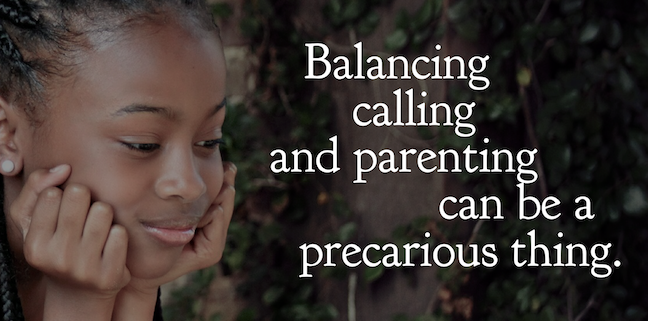 At the end of my last session, she came up to me. There were tears in her eyes, the kind that seem to teeter on that narrow ledge between courage and collapse. She waited for my conversation with another attendee to end, then stepped forward.
At the end of my last session, she came up to me. There were tears in her eyes, the kind that seem to teeter on that narrow ledge between courage and collapse. She waited for my conversation with another attendee to end, then stepped forward.
“When is it okay to take our children off the field and go home?” she said without pausing for the usual hellos.
The story that poured out after I asked her for context was unique to her family, but in so many ways not unique in the world of missions, where balancing calling and parenting can be a precarious thing.
Her family lives in a dangerous place—a conflict-ridden country inhospitable to westerners. Her nine-year-old son struggles with homeschool, with the lack of security and loneliness.
His social options are limited and his parents have tried to enroll him in various activities to expand his friend base, but he’s felt too different and ostracized to really engage. Too scared too.
He cries himself to sleep nearly every night, has frequent headaches and has lost his appetite from the daily stress of just living.
My heart broke for this little boy as I listened to Laurie, whose eyes still glistened with unshed tears. “How long have you lived there?” I asked.
“Five years.”
I tried to mask my surprise. My dismay. “And he’s been hurting for…?”
“Ever since we got there.”
Five years. A lifetime for a child that age. I asked a few more questions about his siblings. They were doing fine. Had anything they’d tried helped even a little? Had there been times when he seemed less overwhelmed and sad?
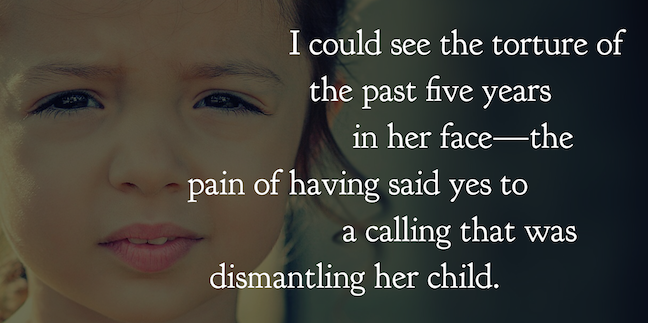 Her answers indicated that nothing had seemed to ease the pain of this little person whose existence had been turned upside down by his parents’ call to missions. I could see the torture of the past five years in this mother’s face—the torture of having said yes to a divine assignment that was dismantling her child.
Her answers indicated that nothing had seemed to ease the pain of this little person whose existence had been turned upside down by his parents’ call to missions. I could see the torture of the past five years in this mother’s face—the torture of having said yes to a divine assignment that was dismantling her child.
“Have you considered leaving the field before now?” I prodded.
“Every day. Every day for the past three years…”
I took a moment to utter a silent prayer. (I do a lot of that when these complicated conversations arise.) And then, in response to the question she’d asked at the beginning of our talk, I said, “I think God knows that you want to take your baby home…and I think you need to trust your mother’s heart.”
That’s when her tears began to fall. Courage yielded to collapse. If there hadn’t been a chair next to her, I think she’d have melted onto the floor. But it wasn’t defeat I saw in her face. It was relief—a deep and certain relief that it was time to make the hardest decision of her life.
The hardest decision? Really? For parents who had left the comforts of their home country to move to a place where their faith could be a death sentence?
Yes. Because following a call to Nepal or Honduras or China is daunting—but it’s also buoyed by a sense of spiritual purpose, brightened by the prospect of “life well lived,” and praised by believers and churches as a noble and sacrificial thing.
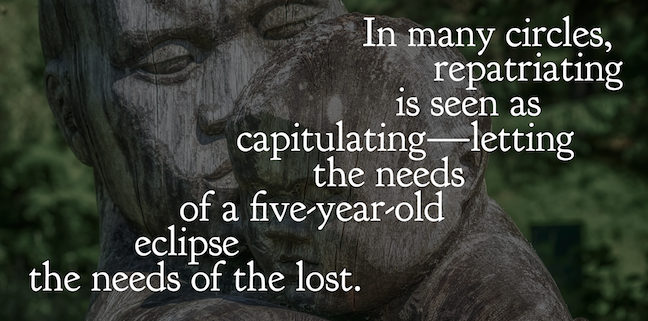 But leaving the field—leaving a ministry that might have taken years to begin—for the sake of a child? In many circles, it’s seen as capitulating. Letting the needs of a nine-year-old eclipse the needs of the lost. Or lack of faith. Or not believing fervently enough that saving souls is worth one boy’s suffering. Or spiritual failure. Because if they’d prayed harder or better, their son would have been healed.
But leaving the field—leaving a ministry that might have taken years to begin—for the sake of a child? In many circles, it’s seen as capitulating. Letting the needs of a nine-year-old eclipse the needs of the lost. Or lack of faith. Or not believing fervently enough that saving souls is worth one boy’s suffering. Or spiritual failure. Because if they’d prayed harder or better, their son would have been healed.
Families who leave the field for the sake of troubled children too often are accused in overt and unspoken ways of choosing parenting over calling.
(I’m not sure how or when the two became dissociated in the Christian world.)
That’s why so many families I’ve encountered would rather try to get their daughter through one more month of depression or their son through one more incident of self-harm or their teenager through one more year of exposure to forces that might derail her future than face the condemnation of The Church.
The suffering of some MKs is undeniable. It can be temporary or long-lasting. Mild or acute. It’s too easy for onlookers to make simple judgment calls about impossible choices without a full, compassionate understanding of what the family has endured.
Each one is unique. Each has its own history and dynamics. Its wounds are specific and intensely felt—and it is supreme arrogance for any of us on the outside to draw a line that legitimizes some choices and denounces others.
WHAT DO MISSIONARIES AND THEIR SENDING AGENCIES (and their families and friends and anyone watching) NEED TO REMEMBER AS THESE CHALLENGES COME TO LIGHT?
- Sometimes callings are for life. Sometimes they’re for seasons. Sometimes they’re misread. Sometimes they’re derailed. And sometimes we’ll just never understand. But God knows.
- God loves the children of missionaries as much as he loves the unreached people they serve.
- God has entrusted parents with seeking the well-being and health of their children.
- God’s heart breaks for those who are wounded and left to languish because of ministry-related neglect.
- No one is indispensable to God. He can see his purposes to completion even if we need to leave our foreign field of ministry.
These foundational truths will be essential sources of clarity as other voices—like guilt, embarrassment, and fear of condemnation—try to exert their power over wise decision-making.
I have no illusion that reaching a conclusion on something this important will be easy. And the process will be different for every family considering departure for the sake of a suffering child.
So rather than offer a simple (and likely ineffective) three-point plan, I’d rather list a few suggestions that might be useful as the process unfolds—actions, perspectives, postures, and communication strategies that have helped other families facing a similar impasse.
SUGGESTIONS FOR FAMILIES CONSIDERING THE NEXT STEP:
- Pray for clarity—and remember that clarity has spiritual, emotional and rational components, all of which God can use to communicate with us. Listen to your soul, your mind, your parent-heart and -gut.
- Pay attention to what your spirit is telling you. Knee-jerk reactions can’t always be trusted, but when that strong desire to make a brave decision for the sake of a child turns into a protracted and insistent nudge, give it some serious consideration.
- Consider where your children rank with regard to “calling.” What has God called you to in the context of family?
- Try not to rush into a huge decision. (Though sometimes an emergency response is required.) Children can have good weeks and bad weeks. So let enough time pass that you can assess what is superficial and fleeting and what is deep-seated and enduring. Look for patterns and trends, then honestly evaluate whether they’re pointing toward improvement or deterioration. But at the same time…
- Don’t fall into the dangerous rut of indefinitely “giving it time.” Laurie and her husband had been giving it time for five years. That means that their son had lived in turmoil for more than half of his nine years of life. That is a lot of pain to carry at such a young age.
- Try to put yourself in the mind of your hurting child. Imagine what it would be like to have his/her personality under the conditions you’re experiencing as an adult. You may have a different kind of resilience than your children do. You may get fired up or worn down by entirely different things than they do. You may feel empowered by circumstances that will crush your daughter or crushed by events that will galvanize your son.
It can be hard for grown-ups with a clear calling to view the world and envision the future the way a five-, ten- or a fifteen-year-old does, but try.
- Consider the impact of age. At some ages, projecting six months ahead is nearly impossible. Being isolated in fifth grade is different than being isolated as a tenth grader. Being treated as an inferior gender might have a greater impact on an adolescent young woman than on a grade-school girl. Remind yourself that feeling an overwhelming sense of being not-stable, not-loved, or not-safe can be excruciating for certain personalities at any age.
- Carefully select the people you let into your processing as you evaluate next steps—trusted friends, mentors, leaders, missionaries who have been there before you. Ask honest, vulnerable questions, and make sure you don’t listen to their answers through the grid of a desired outcome.
- Exclude unwanted voices from your decision-making process. There may be a cacophony of unsolicited opinions coming your way once word gets out that you’re considering a change. It’s okay to tell them that you’ve surrounded yourself with wise counsel and would rather the input come only from them.
- Do not let your hurting child see you resisting or resenting the necessity to leave the field. That it’s hard for you goes without saying and is good for all of your children to witness—it gives them permission to grieve too. But if they sense in any way that you are angry at them for making it necessary, that would only add guilt and remorse to the pain they already carry.
- Be conscious of how you represent God as you explain your reasoning to your children. The choices you make for your child will powerfully demonstrate God’s heart for them.
FREQUENTLY ASKED QUESTIONS:
I. What if only one of our children is suffering, but the others are doing great?
If just one child is hurting and the others are fine, your decision becomes all the more complicated. Regardless—and if only for a season—it may be wise to implement the strategy of first-responders and commit to caring for the most injured first.
I’d also suggest that you avoid making the departure your child’s “fault” when you speak of it. This is particularly crucial if you have other children for whom the move away from your adoptive culture is going to be hard. It’s easy to fall into simple but blame-laying statements like, “We need to go back to Canada because of Amy.” That could set up the other children in your family for resentment. They’re not dumb—they know that Amy is having a hard time. But carefully couching the decision to leave as an act of love rather than a frustrated concession will reduce the likelihood of enduring resentment.
II. How long should we leave the field for?
This is going to be different for every family and every scenario. I see two basic options:
The first is to leave the field permanently. If it’s better for your family, better for your children, better for your conscience, consider this as an option. If everything—prayer, counsel, deliberation—points to an indefinite departure being the right decision, do not let guilt or shame or lack of understanding from others sway you. I believe God will reward you in ways you can’t imagine for doing the right thing for your kids.
The second option is to leave the field for a pre-determined length of time with a reevaluation to happen once you’ve lived outside the context/pressure of foreign ministry for a while. I’d recommend that the initial time frame would be a minimum of two years. I know that feels like a long time, but I’ve known too many children who, given only one year to “hurry up and heal,” have spent the time merely dreading the inevitable return to the field. Two years or more removes that debilitating urgency.
III. How do we deal with the disapproval of others?
There are no easy answers. Condemnation—spoken or merely sensed—is hard to deal with. But keep telling yourself this: God loves and knows your children. He will instruct you in what is best for them. Leaving the field is not a lesser response to a family crisis. It might be exactly the right God-given response.
When the time comes, clearly articulate to your ministry partners that your decision is made. If you’re comfortable giving them a glimpse into what elicited your choice, share that, but be firm in stating that this is the right option for your family at this time. (A word of caution: please don’t make your child’s personal, intimate struggles public knowledge, except for the few people you really trust!)
As much as possible, ask for prayer, not endorsement. And remind yourself that God’s approval is the only one you need.
IV. What if we get home, get help, and nothing seems to improve?
Leaving the mission field may not be an immediate cure. In fact, I’ve known some families whose struggles seemed to intensify after their return to their home culture. Remind yourself daily (hourly?) that healing takes time and that the courage it took to make the hard decision to repatriate is a huge testament to how much you love your child. In that sense, the move itself is an act of love that will bear fruit.
And when doubt arises (as it usually does), stand on the certainty that it is God who directed you to the decision you made—then continue to invest in the care all your children need.
Leaving the field for the sake of a suffering child can be a brutal choice. I hope I haven’t portrayed the decision-making process in a simplistic way. It is as complex and fraught as any deliberation in which calling and parenting seem to be at odds.
If you’re a missionary family who has been through something similar, please share your perspective and guidance in the comments below. How was your decision to leave the field helpful for your children? What would you do differently today? What advice would you give to couples deliberating next steps? How can missionary families better balance divine calling and devoted parenting?
I’d be grateful for your thoughts and wisdom.
Please join the conversation!
- Contribute your thoughts in the comments section below
- Use the social media links to Like and Share this article
- Many of these articles are now available in podcast form. Simply search for “Pondering Purple” on your usual pod platforms, or click this link to be taken to its host page.
- To subscribe to this blog, email michelesblog@gmail.com and write “subscribe” in the subject line
- Pick up Of Stillness and Storm (my novel about a missionary calling gone awry) on Amazon


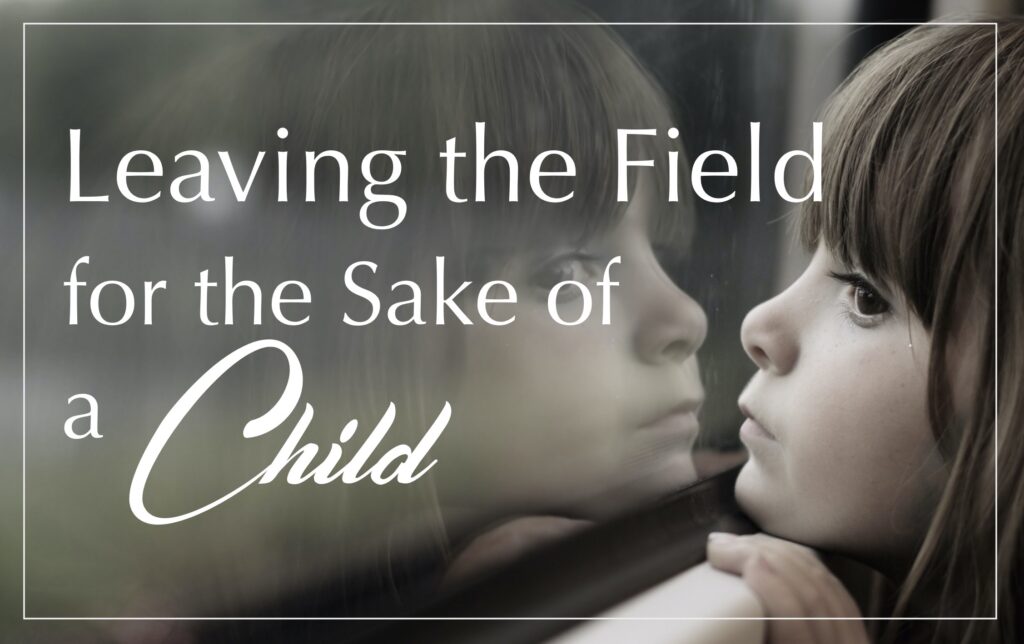
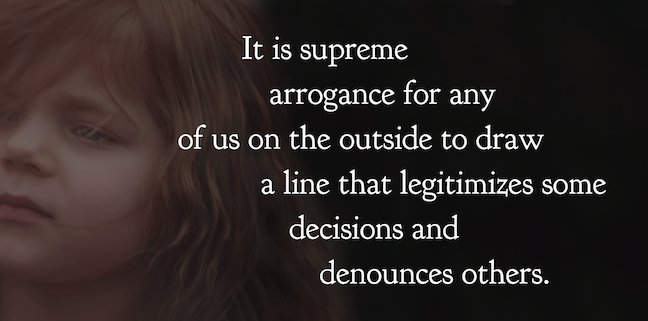
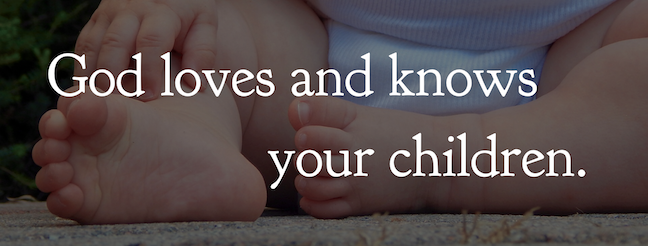
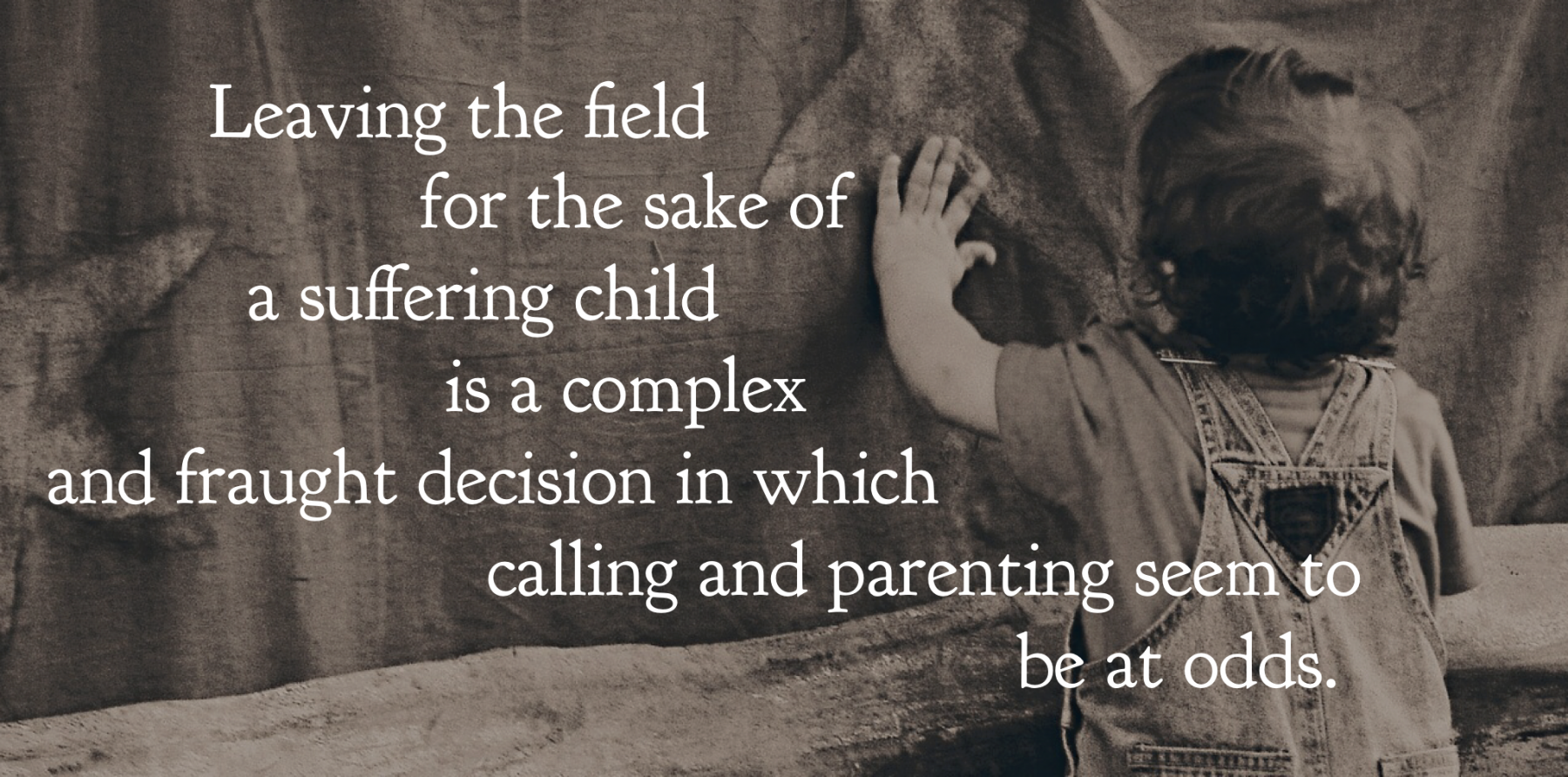

Sylvia Nowlan
We were career missionaries of two decades and had been serving at BFA for four years in October 2005. We heard a message at church where the visiting preacher spoke on Philip and the Eunich. His exact words were, “You may be serving here at BFA and finding the ministry very fulfilling but God may say to you, Go home.” John and I talked later about whether this message was for us as we had felt a prompting from God that maybe he wanted us to return home. A week later our second child phoned us from the USA and said, “ Mum and Dad would you do me a favour?” I replied, “Sure, what is it?”
She said, “ Would you please leave BFA and go home to be with Natasha? She needs you.”
Sonya, seven years older than her sister, had returned to Australia to celebrate Natasha’s son turning one and her grandpa’s 90th birthday. She observed Natasha struggling with motherhood, her marriage and the abandonment of her parents being in Germany and her brother and sister both married to Americans and living in the USA.
This phone call precipitated nine months of grief as we processed the hard decision to leave our wonderful BFA at the end of the school year but we realised that it was not much use being at BFA ministering to other people’s children when our own was falling apart.
Upon our arrival things were so bad that it looked like we had come home too late to make a difference. They were about to get a divorce and she was keeping company with the wrong friends.
We knew that we had to make the decision to not return to the field. A Band-Aid approach of staying a year would just not make any impression upon her deep need. We told her we were staying in Australia permanently.
Two months later she arrived home in the early hours from shooting a wedding. She couldn’t sleep and on a whim put on her wedding DVD and watched it. The pastors words cut deep into her heart and she decided to recommit to her marriage.
I write this 17 years later. We still journey beside her on the beautiful Sunshine Coast of Queensland. Her children are 19, 15 and 10 and her marriage is flourishing. She has realised her dream of becoming a neonatal intensive care nurse and still walks with our God. We will forever be very thankful we heeded God’s directions to us and returned home to be with our emotionally hurting child,
Rebekah Smith
Thank you for sharing that. Your story brought me to tears.
Nadine Newton
Hi Sylvia,
My name is Nadine- currently living Tamborine Mtn Qld. Let’s say I think we have a lot in common. Would love to meet up if you were willing.
Barbara
Thank you so much for sharing about leaving the field to support an adult child. We are a little over one month away from our exit date from the field. Our daughters are 24 and 21 and live in the US. One is struggling and they both asked us to leave the field. It wasn’t the entire reason, but a large part of why we did. It was a struggle to make that decision but our field has been so understanding and supportive and God has shown us it is time.
michele
Bless you for making such a difficult and important decision. May God continue to affirm your courage, rightness, and love.
Shary Hauber
I am thankful my parents put my brother first. We came to the States because of his health. The doctor said it would not be wise for us to return because of his health. The mission asked my parents to put him in a home and return to the field. I was a young teen and my parents asked me to think and pray about it for a week. It was a three way decision we all said No we would stay in the States with Kenny. We did return after his death. I say that is one of the most important things my parents ever did, we as children came first.
Catherine White
Thank you for this important point. We served 5 yrs in a Muslim country. I have a girl and boy. We were expected to put them in local school for a yr to get language in 1 and 2 nd grade. They were bullied and hated and hurt deeply and they live with those scars today as teens. When my daughter was depressed I felt like even though ministry was great, we would be hurting the family. We have been home 4 years now. It has not been easy at all returning either but I am glad we did before college so they could get counseling and help here. Praying for all.. I still miss the field for myself with a massive grief everyday and still learning to love the states again, but getting through it.
Cynthia Ann Storrs
Excellent article. Our challenge was wondering if we should have left when one of our children was in college. This is an area that should be given consideration as well. For some, having parents on the other side of the world is a distance too great to overcome. It was never discussed in our mission. I think the assumption was “If they got this far, they should be good The decisions that students are making at that stage are life-altering, and they are often away from home, far away, for the first time. Again, there are no formulas, but the discussion should be permitted without recriminations from sending agencies or supporting churches. And here is a place where sending agencies and supporters could help so much, but often don’t.
Nicole Giroux
My parents did not leave the field, but sent me home by myself. It took me 20 years to deal with the trauma!
I think that is an answer in itself!
Karen Glovka
30 years ago, as a single, I left my field to come home and help my recently widowed mother raise two grandchildren. I’m one of two siblings, and that sibling (mother of the two children) was pursuing a destructive lifestyle. One year became two, and I knew I would need to resign as God had made my parenting role important to me. It hurt, but what hurt worse was my director’s letter to the home office questioning my call to missions AFTER my resignation. My almost 10 years in the country were fruitful, I joined a home mission, joined and ministered in an ethnic congregation (still doing that), and teach English to international students. “Call” can be to people group or type of ministry, and with all the flexibility we have today with travel/communication, I think it is important to keep in mind that the call to missions may result in multiple placements over a lifetime, not just one. My mom is no longer living, the children are fine adults, and the sibling is now clean and sober. I believe God used me to do what He called me to do in that season of my life.
Julie Sanders
Thank you so much for this article. It would take too long to explain why it’s so personal and so on target, but thank you. I’ll just add a couple of thoughts to this important conversation. First of all, I totally agree that it can be more difficult to come home than it ever was to go. God definitely uses time and wise counselors to heal the deep wounds and the losses experienced by each family member in their own way.
Second, it’s evidence of God’s mercy when he helps our church and our supporters to have some degree of understanding and compassion. For most, they don’t have personal experiences to connect this turmoil, too. During a time when we need so much grace, we also have to give it.
Last, I think we found that, while these are some of the darkest waters we walk through as parents, our children need to hear the story later in life. They’re probably not ready for all of it when the most difficult decisions come or the healing begins. As they grow older and identify questions of their own, we may need to revisit our shared narrative that will add to their understanding and ours, give them permission to dialogue about their experience, and affirm God’s sovereign and loving work in the life of our family. One conversation usually isn’t enough. God will keep using all of the experience, the good parts and the painful parts, in his larger and longer plan for our lives, and in those of our children.
Jen Ant
Good afternoon. This topic is something that my husband and I have dealt with over 20 years of intercultural work in South Asia. The discussion that my husband and Ihad for nearly a year going back and forwards about staying or going put a lot of stress on our marriage as we both processed and approached the topic very differently. However our hearts were aligned but we had to allow each to reach that place .. we failed to be patient with one another. We left the field so that my children could get more help with their education.. it wasn’t a permanent move ( it was at the time).. but God brought us back to the field a few years later .Each year we are here I thank God for his mercy in allowing us to participate in His ministry. We have teenagers and young adults and the question is always there how do you balance family and calling.. we dont fear others opinions about how we managed our family but I think sometimes we are ruled by 1. How much effort/prayer/fundraising it took to get us back for another term 2. Completing what we start- finishing the term. Sometimes I think it can’t be this cut and dry.. things happen.. children develop needs. It’s takes a lot of courage to see the season changing and to make such a call to go home.
Abigail Follows
Thank you SO much for writing about this. <3 We left our first mission field after 7 years for the sake of our child. It was an extremely difficult decision. But God gave us peace and the clarity to make that decision. We eventually relaunched to a different location. Because we were willing to do what it took to care for our child by leaving our first country of service, she thrived in the new location. She now feels called herself to be where we are, speaks the language here, and understands and loves our calling, too. I also recently met another family who is switching locations for the sake of kids. Leaving a place doesn't have to mean leaving God's work or denying our calling. We can be creative in meeting needs and doing ministry. There are even some working remotely to reach people they had to leave behind.
Rick Burdett
I appreciate the loving and wise words she gives in this article. God gives us family to show his love to us in a unique way. When we violate loving our family by not taking care of them, what does that say about our mission? I have a friend who has served the past 17 years in a complex country to serve in and was only just now beginning to see some spiritual fruit. She made a tough decision to return home to take care of her ailing mother, which is the opposite of dealing with an ailing child, but the principle remains the same.